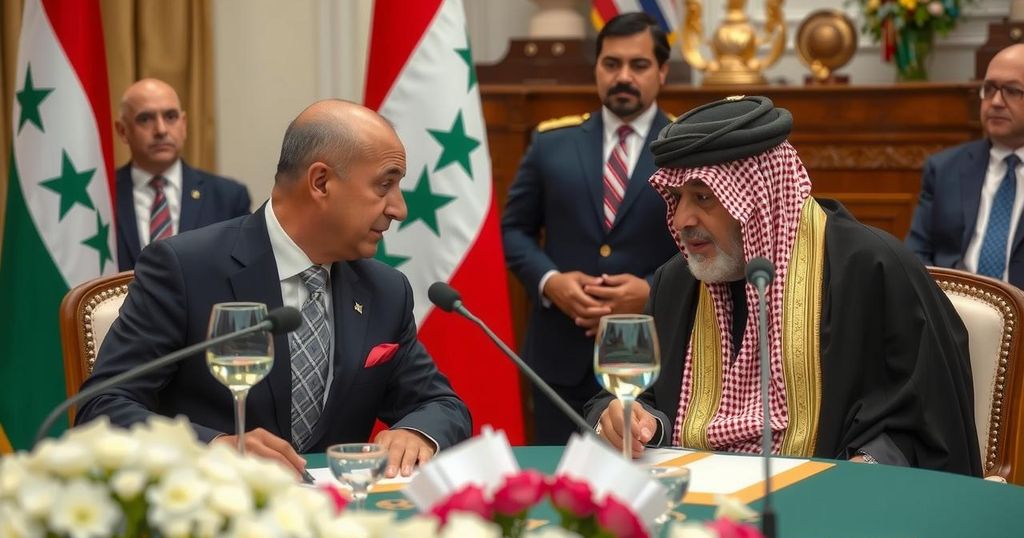Jordan’s Foreign Minister Ayman Safadi met with Syria’s new leader Ahmed al-Sharaa, expressing Jordan’s readiness to assist in rebuilding Syria after the overthrow of President Bashar al-Assad. The discussions focused on regional stability, security at the Jordan-Syria border, and condemnation of foreign attacks. Numerous regional leaders are engaging with Syria’s new administration, aiming for diplomatic recognition and support for the Syrian populace.
The Jordanian Foreign Minister, Ayman Safadi, engaged in discussions with Ahmed al-Sharaa, Syria’s new leader, as Jordan expresses its willingness to assist in Syria’s reconstruction following the recent regime change. During the meeting in Damascus, Safadi emphasized Jordan’s solidarity with the Syrian people, stating their commitment to fostering a stable and safe Syria that respects the rights of its citizens through an inclusive transitional process.
Moreover, high-ranking officials from Qatar and Turkiye have also visited Syria in recent days, illustrating a regional push to engage with the new administration. Safadi highlighted the importance of security and stability in Syria, especially given Jordan’s significant border with the country, and reiterated Jordan’s stance against Israeli attacks, advocating for respect towards Syrian sovereignty. Additionally, Safadi condemned the drug and weapons smuggling challenges along their common border, which have escalated in recent years, specifically referencing the smuggling of the stimulant Captagon.
Regional relations have begun to shift post the fall of President Bashar al-Assad, with al-Sharaa seeking recognition from neighboring states and engaging in dialogues with various Arab and Western officials. Observers suggest that this renewed diplomatic activity signals a shifting perspective on Syria in the region, particularly in light of the suffering endured by the Syrian people over the last decade. Iran, meanwhile, reaffirmed its commitment to Syrian sovereignty amidst these developments, emphasizing that foreign interference must not dictate Syria’s future.
The article reflects the political landscape in Syria following the overthrow of President Bashar al-Assad, marking a significant turning point in the nation’s governance. This transition has prompted regional leaders, notably from Jordan, Qatar, and Turkiye, to reestablish diplomatic relations and support Syria’s reconstruction. The formation of a new Syrian government under al-Sharaa has created opportunities for dialogue with neighboring countries, all eager to promote stability and influence over the future trajectory of Syria post-conflict. The geopolitical dynamics that unfolded during and after the Syrian civil war continues to evolve, especially as international sentiments shift regarding involvement in Syrian affairs.
In summary, Jordan’s Foreign Minister Ayman Safadi has articulated a commitment to support Syria’s reconstruction and stability following the recent political transition. This engagement signifies a broader regional effort to rebuild diplomatic ties and foster cooperation among neighboring countries. The challenges of security, drug trafficking, and foreign intervention remain pivotal topics of concern as Syria navigates its post-conflict future.
Original Source: www.aljazeera.com






